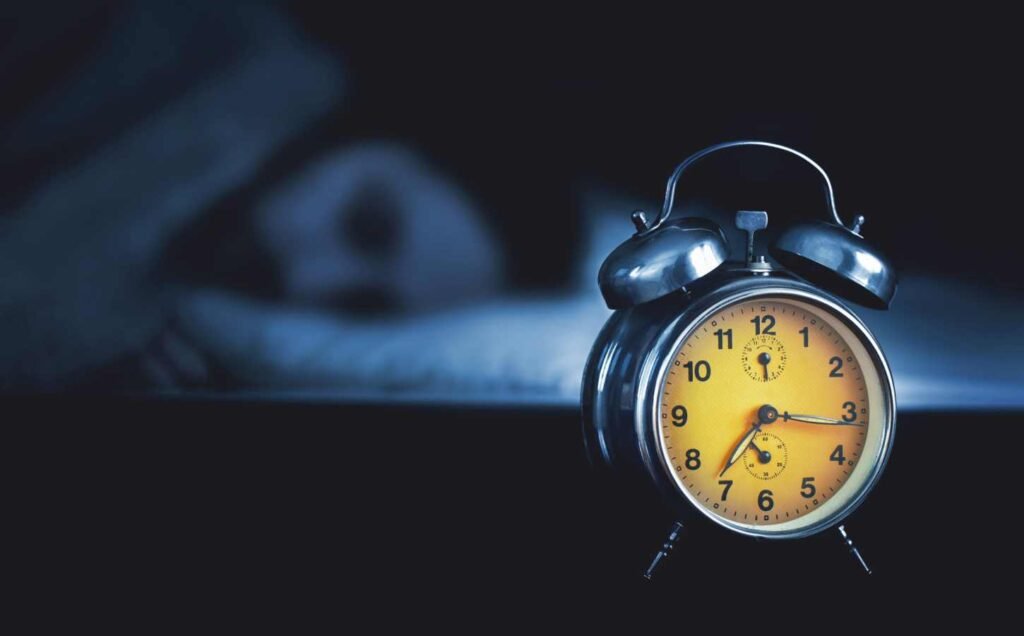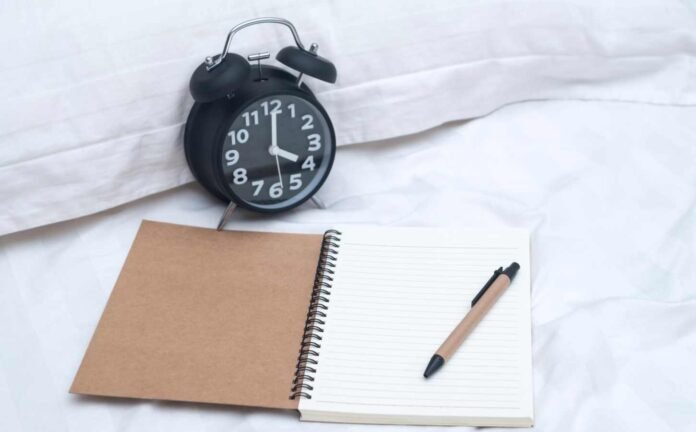Keeping a sleep diary can be an effective way to track and improve one’s sleep patterns.
Keeping a sleep diary involves recording information about when and how long one sleeps, as well as any factors that may have affected the quality of sleep. This can include things like caffeine or alcohol consumption, exercise, stress levels, and medication use.
By keeping a sleep diary, individuals can gain insight into their sleep habits and identify potential areas for improvement. For example, if someone consistently wakes up feeling tired despite getting a full night’s sleep, they may be able to pinpoint factors such as late-night screen time or a noisy sleeping environment that are disrupting their rest. With this information, they can make targeted changes to their routine and environment to improve the quality of their sleep.
Overall, keeping a sleep diary is a simple and accessible tool for anyone looking to improve their sleep health. With consistent use, it can help individuals identify patterns and make positive changes to their sleep habits, leading to better overall health and well-being.
Creating Your Sleep Diary
Understanding the Basics
Before creating a sleep diary, it is important to understand what it is and how it can help improve your sleep. A sleep diary is a tool used to record various aspects of your sleep patterns and habits. By tracking your sleep, you can identify any patterns or issues that may be affecting the quality of your sleep. This can help you make changes to your routine and improve your sleep.
Recording Sleep Patterns
To create a sleep diary, you can use a paper journal or a digital app. The Consensus Sleep Diary is a widely used tool that includes various components such as bedtime, time taken to fall asleep, number of awakenings, total sleep time, and wake-up time. You can also include any notes about the quality of your sleep and any issues you may have experienced.
It is important to record your sleep patterns consistently, ideally every day, to get an accurate picture of your sleep habits. This can help you identify any patterns or trends that may be affecting your sleep quality.
There are affiliate links on this page, which means we may earn a small commission should you buy after clicking on one, or more of those links. At no extra cost to you.
- Health Journals, Gift Loft (Author)
- English (Publication Language)
- 100 Pages – 02/01/2020 (Publication Date) – Independently published (Publisher)
Tracking Influencing Factors
In addition to recording sleep patterns, it is important to track any factors that may be influencing your sleep. This can include exercise, alcohol consumption, caffeine intake, medications, mood, stress, and light exposure. By tracking these factors, you can identify any correlations between them and your sleep patterns.
It is important to be honest and accurate when recording these factors in your sleep diary. This can help you identify any habits or behaviors that may be affecting your sleep and make changes accordingly.
Overall, creating a sleep diary can be a helpful tool in improving your sleep quality. By tracking your sleep patterns and influencing factors, you can identify any issues and make changes to your routine to improve your sleep.
Analyzing and Utilizing Diary Data
Identifying Sleep Problems
Analyzing sleep diary data can help identify sleep problems. One of the most common sleep problems is insomnia, which is characterized by difficulty falling asleep or staying asleep. Insomnia can be caused by various factors such as stress, anxiety, and poor sleep hygiene. By analyzing sleep diary data, individuals can identify patterns and triggers that may be contributing to their insomnia.
Another common sleep problem is sleep apnea, which is a sleep disorder characterized by pauses in breathing during sleep. Sleep apnea can cause snoring, daytime sleepiness, and other health problems. Analyzing sleep diary data can help individuals identify symptoms of sleep apnea such as snoring and daytime sleepiness, which can prompt them to seek medical attention.
Improving Sleep Hygiene
By keeping a sleep diary and analyzing the diary data one can also help improve their sleep hygiene. Sleep hygiene refers to the habits and practices that promote good sleep. By analyzing sleep diary data, individuals can identify factors that may be negatively impacting their sleep hygiene such as caffeine consumption, irregular sleep schedule, and poor sleep environment.
Some ways to improve sleep hygiene include establishing a regular bedtime routine, creating a relaxing sleep environment, and avoiding stimulating activities before bedtime. For example, individuals can incorporate relaxation techniques such as deep breathing or using lavender essential oil to promote relaxation and improve sleep quality.
Consulting Healthcare Professionals
Analyzing sleep diary data can be a useful tool for healthcare professionals in diagnosing and treating sleep disorders. Sleep specialists may use data from sleep diaries in conjunction with other tests such as polysomnography or actigraphy to diagnose sleep disorders such as sleep apnea or insomnia.
Once a diagnosis has been made, healthcare professionals can develop a treatment plan that may include medication, lifestyle changes, or other interventions to improve sleep quality. By analyzing sleep diary data, individuals can provide valuable information to healthcare professionals that can aid in the diagnosis and treatment of sleep disorders.
In conclusion, keeping a sleep diary and analyzing the data can be a valuable tool in identifying sleep problems, improving sleep hygiene, and consulting healthcare professionals for diagnosis and treatment of sleep disorders. By incorporating good sleep habits and seeking medical attention when necessary, individuals can improve their overall health and well-being.
Frequently Asked Questions
What are the essential components to include in a sleep diary?
A sleep diary should include the time you go to bed and wake up, the total time you spent sleeping, and any disruptions or awakenings during the night. You should also record any factors that may have influenced your sleep, such as caffeine or alcohol intake, exercise, stress levels, and medication use.
How can a sleep diary help manage insomnia?
Keeping a sleep diary can help identify patterns and triggers that affect your sleep quality. By tracking your sleep habits and daily activities, you can better understand what may be causing your insomnia and make lifestyle changes accordingly. Additionally, sharing your sleep diary with a healthcare professional can help them develop a personalized treatment plan.
What is the recommended duration for maintaining a sleep diary to observe sleep patterns?
It is recommended to maintain a sleep diary for at least two weeks to observe sleep patterns. However, it is best to continue tracking your sleep habits for a longer period to identify long-term patterns and changes.
Are there any mobile applications recommended for keeping an electronic sleep diary?
There are several mobile applications available for keeping an electronic sleep diary, such as Sleep Cycle, Pillow, and SleepScore. It is recommended to choose an app that suits your needs and preferences.
How should a parent fill out a sleep diary for their child?
A parent should record the time their child goes to bed and wakes up, the total time their child spent sleeping, and any disruptions or awakenings during the night. Additionally, parents should record any factors that may have influenced their child’s sleep, such as nap times, exercise, stress levels, and medication use.
Where can I find a printable or downloadable sleep diary template?
There are several printable and downloadable sleep diary templates available online. Some examples include the National Sleep Foundation’s Sleep Diary and the American Sleep Association’s Sleep Diary. It is recommended to choose a template that suits your needs and preferences.
Or if you prefer there is this Sleep Diary on Amazon.com
There are affiliate links on this page, which means we may earn a small commission should you buy after clicking on one, or more of those links. At no extra cost to you.

Maintaining a Regular Sleep Schedule: Tips and Benefits

MaryRuth Organics Sleep Gummies Without Melatonin Review: Do They Work?

These gummies are designed to promote relaxation and support sleep quality for adults. Unlike many other sleep aids, they don’t contain melatonin, so you won’t wake up feeling groggy or drowsy.
Continue reading: MaryRuth Organics Sleep Gummies Without Melatonin




